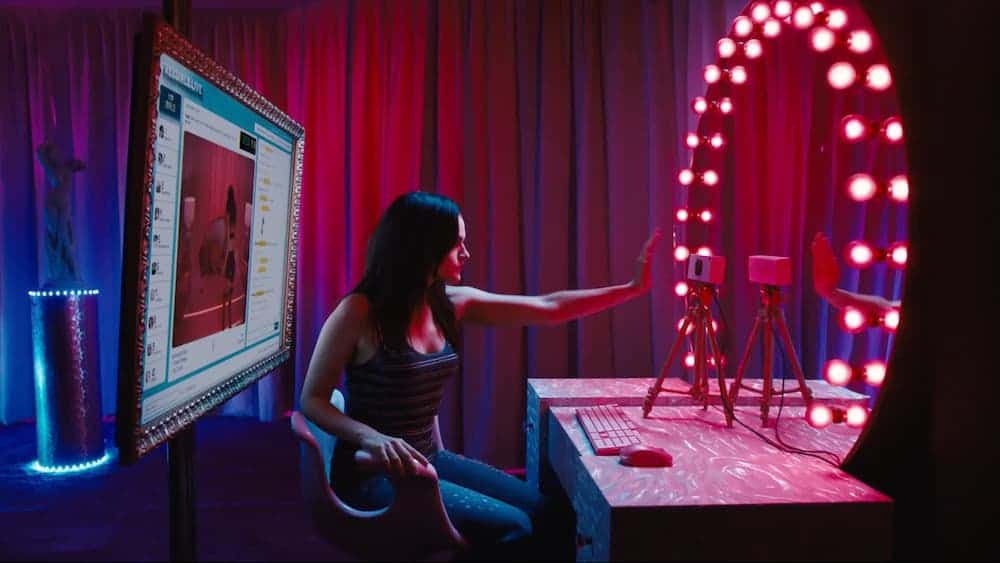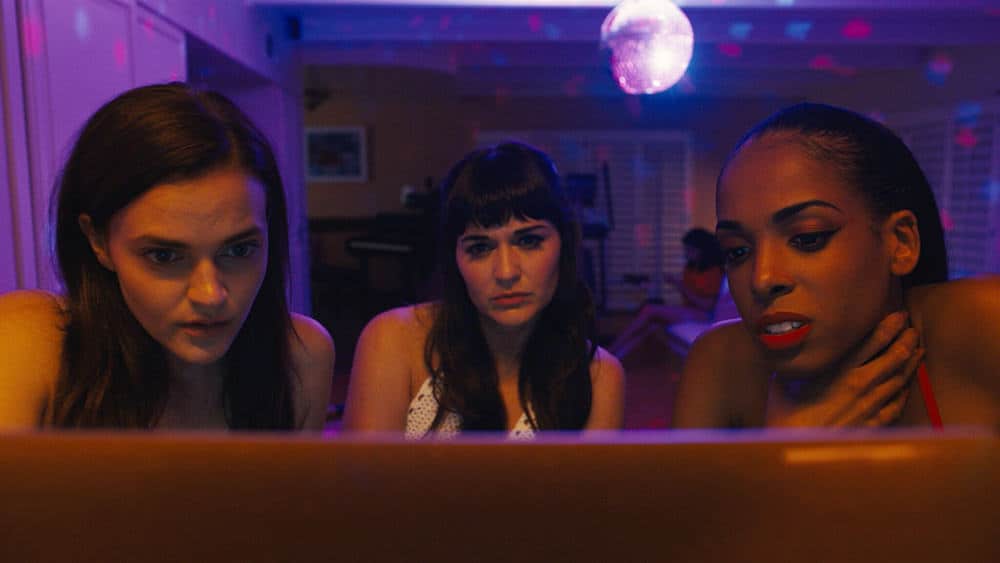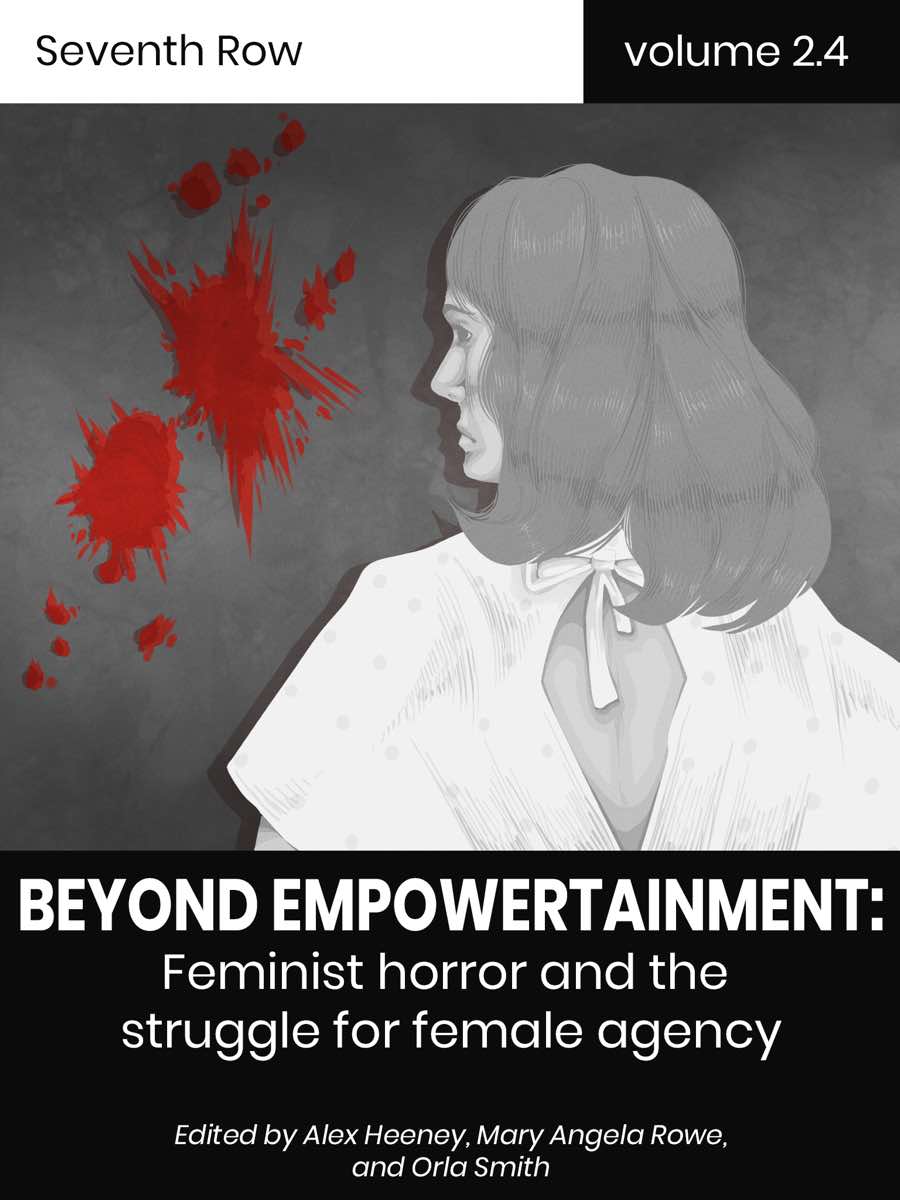In Daniel Goldhaber and Isa Mazzei’s horror film Cam — which premiered at the Fantasia Film Festival in Montreal — the villain isn’t sex work, but a camgirl’s lack of protection and agency.
This is an excerpt of the essay which appears in the ebook Beyond Empowertainment: Feminist Horror and The Struggle for Female Agency. Get your copy of the ebook here.

These days, most people on the internet must be at least vaguely familiar with the notion of camgirls: young women who film and broadcast themselves on dedicated platforms where paying viewers (mostly men) can send them comments and offer them gifts. Fewer of us know about the daily reality of a camgirl. As conversations around sex work and feminism enter the mainstream, the daily life of online sex workers is something of a last frontier.
In Cam, Madeline Brewer plays Alice, a young woman who spends most of her time and energy perfecting her online image to attract as many viewers as possible and go up in the ranks of the website. Under the name of Lola, Alice entertains her viewers and biggest — read, richest — fans according to strict self-imposed rules: she never takes her top off (it is considered cheating), but isn’t opposed to faking a hyper realistic slit-throat suicide to get a few more views. The film opens on Alice/Lola doing just that, foreshadowing Cam’s insidious horror undercurrent. One day, Alice finds herself unable to log into her account: someone else who looks exactly like her, and who seems to be standing in an exact replica of her carefully customised room, has taken her place.

As Alice tries desperately to recover her account and chase away this digital ghost of herself, Cam explores the details of video sex work without discrediting the camgirls themselves. Naturally, the job comes with its wealth of creeps, but most of them are harmless. Alice herself intelligently plays on the offensive cliche that sees sex work as inherently dangerous (rather than simply stereotyped and therefore under-protected). The hostile user whose menacing comments prompted her “suicide” was in fact one of Lola’s friends, a fan logged in through another account to help her make the stunt appear more realistic.
Want to read the rest of the interview? Order a copy of our ebook on feminist horror beyond empowertainment here.
[wcm_restrict]
These users only become truly dangerous when the ghost Lola, a sort of machine algorithm that would do anything to go up in the rankings, gives them access to Alice’s real life. As the ghost proceeds to break every one of Alice’s self-imposed rules, the horror story at the centre of Cam highlights in a highly original manner the importance of these rules, and of granting sex workers agency. Beyond revealing Alice’s real identity and address, the ghost also performs activities and sexual acts that Alice always decided against, putting her relationship with her online fans in jeopardy.
The villain in Cam thus isn’t sex work itself, but whatever entity has decided to strip Alice of her agency, put her in danger, and prevent her from doing the work that she loves. As Lola wreaks havoc with Alice’s personal life, the film intelligently underlines the error — and the horror — in the commonly accepted notion that sex workers are entirely defined by their job. When Alice’s mother eventually comes around to appreciating all the efforts that her daughter puts into her work, the film shows us a healthy and positive way to treat sex workers — simply, as we would treat anyone with any other job.
[click_to_tweet tweet=”‘The villain in CAM isn’t sex work itself, but whatever entity has decided to strip Alice of her agency, put her in danger, and prevent her from doing the work that she loves.'” quote=”‘The villain in CAM isn’t sex work itself, but whatever entity has decided to strip Alice of her agency, put her in danger, and prevent her from doing the work that she loves.'”]
The film’s theme of the relationship between online and real life is supported by a strikingly clean-cut, colourful visual style. Neons and low angles echo the unreality of online life and the simplicity viewers seek on the internet, while letting IRL messiness stand out in sharp contrast. Less impressive is the reveal about what this ghost entity is and what its motivations are, but this disappointment doesn’t take away from the dramatic final showdown between Alice and her doppelgänger. Cam — which will soon be available on Netflix — is fun but never at the expense of its heroine, a sex worker who just wants to be able to do her job safely.
Documentary Blowin’ Up charts the efforts of the various people working in one American courtroom that specialises in protecting sex workers. Judge Toko Serita essentially decriminalises sex work. The women who visit her courtroom — many of them working for abusive men and lacking the resources necessary to leave and to find other forms of employment — are enrolled in a mentorship program which, if they stick to it, ensures that their charges are cleared from their record within six months.
[/wcm_restrict]


